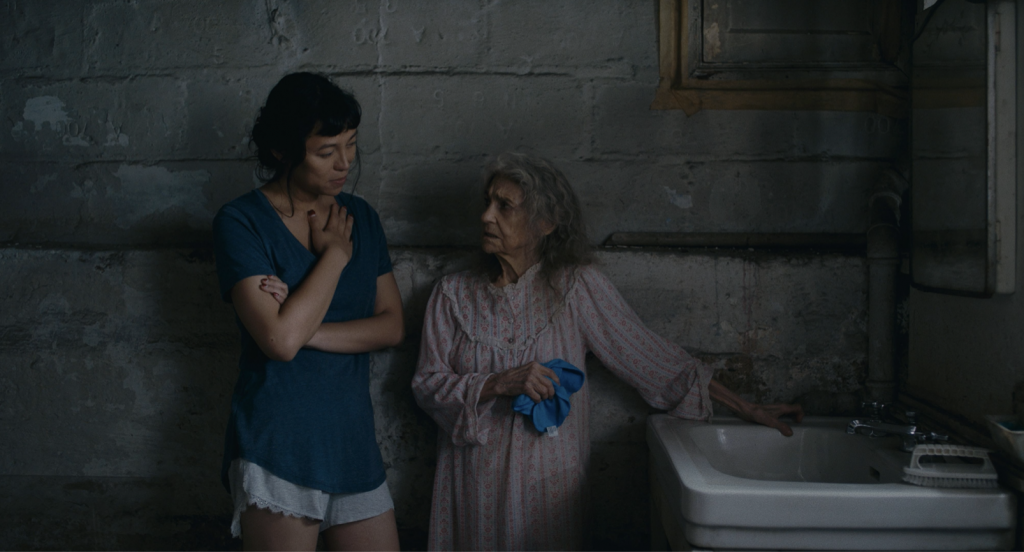In this beguiling drama, an undocumented Filipina immigrant paranoid about deportation works as a caregiver to a Russian-Jewish grandmother in Brighton Beach, Brooklyn. When the American man she’s secretly paying for a green card marriage backs out, she becomes involved with a slaughterhouse worker who is unaware that she’s transgender. I had the opportunity to speak with Isabel Sandoval via phone to discussed on taking the full task in Lingua Franca.

Nancy Tapia: I have to start with the title Lingua Franca. Why the title?
Isabel Sandoval: Lingua Franca, the dictionary definition is bridge language. In a country like the U.S., between immigrants English would be the lingua franca. When they communicate, you do use the term, ironically in that, what is most important between the two characters, Olivia and Alex is what is left unsaid and unarticulated. Lingua Franca is a drama of inferiority. And it’s about introverted, reserved characters who are not able to articulate how they feel out of a sense of shame or guilt. The film invites the audience to not just listen to the dialogue, but to pay attention to its pauses and its silences. That’s where the characters are about truth authentically.
Nancy Tapia: That’s actually one of the things I wanted to ask you, because in this film you produced it, you wrote it, edited, directed, starred… You had your hands full.
Isabel Sandoval: Yeah, I did. I have to be honest, I enjoyed it so much. Filmmaking is my passion and all these different roles to take upon, writing, directing, editing, are parts and process of filmmaking. I thought of myself as doing just one job, which is to tell a story and to make a film that just happened to have multiple aspects to it. I also go into my film, when I make a movie, I have a very, very clear idea of the kind of film that I wanted to make. So I wore the hats that I thought were important for me to make sure that I fulfilled my creative vision for the film as I had imagined it. That meant writing the script and directing and editing the film and playing the main protagonist. I wasn’t intimidated or daunted by that whole experience because ultimately I thought I had just one job, which is to tell a story and make a film that happened to have multiple aspects to it. I also, I’m conscious of the fact that there are not a lot of films about this particular subject matter and character made by minority filmmakers like myself. I thought there was something inspiring and hopefully empowering about the fact that I’m the talent, both a key creative talent, both in front of and behind the camera telling a story like this.
Also Check Out: Charlie Plummer Discusses Playing A Teenager With Schizophrenia In Words On Bathroom Walls [Exclusive Interview]
Nancy Tapia: I read somewhere that you’ve made history with Lingua Franca. At the 2019 at Venice International Film Festival, for being the first film produced, written, edited, directed by and starring an openly trans woman of color on screen. Congratulations.
Isabel Sandoval: Thank you. Thank you so much.
Nancy Tapia: That’s a big barrier to break being a first. How does it feel? How does that success feel and how do you feel about breaking that barrier for future transgender filmmakers?
Isabel Sandoval: I’m ecstatic. It’s such a validating experience because I did encounter some difficulties and challenges in getting the film made and also tell the story that ended up getting told in the final film. We had some potential investors and production partners that wanted to take the story a different way. Like have actual outbursts of physical violence, which is becoming a trope in films that feature transformative characters and I did not want to go in that direction. When we got the email from Venice saying that we got in, it’s such an incredibly, incredibly validating feeling for me as an artist and as an author and have been to international film festivals where I had people in the audience approach me and said that as aspiring filmmakers and some of them also happened to be trans, were actually emboldened to just do it and make their own art.
Nancy Tapia: This story for Olivia’s character, is based on a Filipino gal and the struggles of being undocumented in the U.S. How did you come up with this story?
Isabel Sandoval: Certainly. A French filmmaker once said that filmmakers make the same movie over and over again, and that they revisit the same themes and issues and conflicts. I’ve certainly noticed that in my work, I gravitate toward stories of women, particularly marginalized, or disempowered women who are forced to confront and to make very private and personal choices within hot sociopolitical settings and environments. I started writing Lingua Franca as I was undergoing my gender transition and halfway through writing the scripts, Trump got elected. So that kind of plunged me into an emotional crisis, just feeling anxious and tense and vulnerable about, just like any other minority in the U.S. at that time, or any other American that cared about democracy. I really captured and wanted to capture and to still my emotional state at that time. These things shaped and influenced what became the premise of Lingua Franca.
Nancy Tapia: So, there are many Olivia’s out there today. What would be your personal advice to them out there living in similar situation?
Isabel Sandoval: You’ll survive. I think more than just, although it sounds like a romantic drama, in the climax of the film, Olivia makes a decision with regard to Alex’s offer of marriage that seems counter intuitive and impractical and foolish. That is when I make the audience regard and see Olivia more than just as a trans woman who was involved with a cisgender man or immigrant without papers. I’m comparing them to try to put themselves in Olivia’s shoes and to see her situation from her perspective in that ultimately she wants to gain back her agency and not have to resort to marry a man who exploited her deepest fears and own abilities, because he could. Yet, I want it to be a story of her resilience and survival. So I think the Olivia’s out there are already doing what I’m showing the Olivia in my film is doing, in that we’re taking it one day at a time and that we’re just surviving. November is going to come soon and who knows what will happen…
Nancy Tapia: Indeed.
Isabel Sandoval: …After that. We’ve made it this far and we’re going to continue to thrive.
Nancy Tapia: Right. Well, they’re not alone. That’s for sure.
Isabel Sandoval: Exactly.

Nancy Tapia: This is your third film as a filmmaker. You made Señorita in 2011, Apparition in 2012 and now Lingua Franca your third film. Is film making getting easier?
Isabel Sandoval: Yeah, certainly. I feel like in a way it feels like my first film as a “minority”, now being a trans woman of color in the U.S. but the fact that I have made two features which have been quite well received, has certainly both given me confidence in approaching potential collaborators and partners, and also made investors feel a trust. My sensibility and my talent as a filmmaker, I have a body of work that I can show them and a track record. So, and yeah, I’m quite happy. Lingua Franca, as with every film project that’s funded by private equity, it’s a risk, investment-wise, but I’m happy that Lingua Franca has done quite well. And it was actually released in France last month and made decent box office.
Also Check Out: Coral Peña And Kara Young Discuss Chemical Hearts [Exclusive Interview]
Nancy Tapia: Well, that’s great! And just out of curiosity, you’ve gained all your success here in the U.S., do you think you would have been able to reach this much success in your motherland, or do you think there are still a lot of limitations?
Isabel Sandoval: I think it’s going to be a lot difficult in the Philippines from an aesthetic perspective, as well as an economic one. For one, I think when it comes to aesthetic sensibility and just taste, mainstream movies in the Philippines tend to be, especially drama, seems to be very melodramatic and hysterical, and my style is more subdued and reserved and languorous, so I feel like there’s definitely more curiosity and openness here in the U.S., in Europe, for more arthouse style films. Also economically, the Philippines is a much smaller market and even there’s no distribution network of theaters that could, that really showcase and exhibit arthouse and independent films. There’s more of that infrastructure set up here in the U.S.
Nancy Tapia: Thank you for sharing that for us that are not familiar with the Philippine market. To finalize the interview, you have a pending film, Tropical Gothic, is there anything you can share on that?
Isabel Sandoval: Yeah. I actually just finished the script of Tropical Gothic during this pandemic. It’s about, so I shot my first two features in the Philippines and Lingua Franca here in the U.S. of course, but for my fourth one I’m going back to the Philippines, all the way back to the 16th century and shooting, I’m making a colonial drama with surreal elements about the haunting of a Spanish colonizer by a native priestess who got stripped of her property and farmland by the new settlers. It has shades of Hitchcock’s Vertigo.
Nancy Tapia: Interesting. And you’re behind everything again?
Isabel Sandoval: I’m not acting this time, but I am writing, directing and editing unless it ends up getting picked up by a big high profile production company or studio, then I would have to just stick to writing and directing this time.
Nancy Tapia: Gotcha. Well, I mean it would be great if that were to happen for you too!
Isabel Sandoval: Yeah. And I’m trying to leverage the momentum that I’m getting from the press, that Lingua Franca is getting here in the U.S. to get interest in Tropical Gothic.
Nancy Tapia: Yeah. I’m sure it will be great and we’ll all be able to view it in select theaters and on Netflix as of August 27th.
Isabel Sandoval: Yes! Very exciting!
Nancy Tapia: Congratulations. Thank you for your time. And I wish you a lot of success with Lingua Franca and Tropical Gothic.
Isabel Sandoval: Thank you so much.
Lingua Franca is available in select theaters and on Netflix starting August 26th.
Source: LRM Online Exclusive

 FOR FANBOYS, BY FANBOYS
Have you checked out LRM Online’s official podcasts and videos on The Genreverse Podcast Network? Available on YouTube and all your favorite podcast apps, This multimedia empire includes The Daily CoG, Breaking Geek Radio: The Podcast, GeekScholars Movie News, Anime-Versal Review Podcast, and our Star Wars dedicated podcast The Cantina. Check it out by listening on all your favorite podcast apps, or watching on YouTube!
Subscribe on: Apple Podcasts | Spotify | SoundCloud | Stitcher | Google Play
FOR FANBOYS, BY FANBOYS
Have you checked out LRM Online’s official podcasts and videos on The Genreverse Podcast Network? Available on YouTube and all your favorite podcast apps, This multimedia empire includes The Daily CoG, Breaking Geek Radio: The Podcast, GeekScholars Movie News, Anime-Versal Review Podcast, and our Star Wars dedicated podcast The Cantina. Check it out by listening on all your favorite podcast apps, or watching on YouTube!
Subscribe on: Apple Podcasts | Spotify | SoundCloud | Stitcher | Google Play



